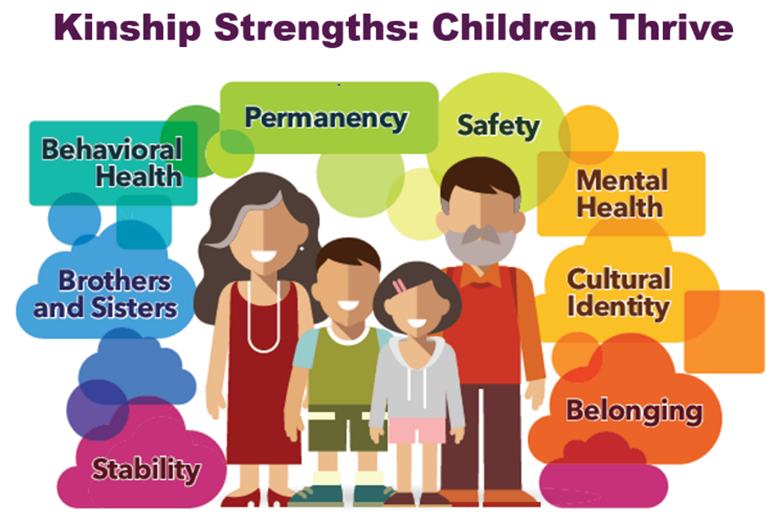General Resource
New Federal Rule Supports Kinship Families in Foster Care
Download This Resource
On September 28, 2023, the U.S. Administration for Children and Families (ACF) issued a final rule that explicitly gives all Title IV-E child welfare agencies the option to use kin-specific foster care licensing or approval standards and encourages them to limit those standards to federal safety requirements. This change will allow more children to be cared for by those they know and love and be financially supported like children with non-kin foster parents.
The rule is a significant move forward for thousands of children who are placed with kin in foster care and yet do not receive monthly financial assistance to meet their needs. These children, who are disproportionally Black, Indigenous, and/or in underserved rural areas, do not receive this support simply because their kin are not licensed or approved according to the set of standards developed for non-kin foster parents.
By allowing tailored licensing or approval standards for relatives and kin, the rule promotes equity for all children in family foster homes and will prevent children from going into group or institutional placements when they can be placed with loving and supported kin instead. Children who are placed in group homes often have kin nearby who want to provide them with a home but cannot do it without monthly foster care maintenance payments. The new rule opens the door for supporting children with kin by encouraging agencies to implement kin-specific standards that do away with stringent requirements that lack a clear nexus to safety.
What the New Rule Means & Does Not Mean
Simply put, this new rule changes a federal regulation that was interpreted as dictating that each Title IV-E agency can only have one set of foster care licensing or approval standards that apply equally to kin and non-kin. 45 CFR § 1355.20. These agencies may now have a kin-specific licensing or approval process. Kin approved to care for a child under that process must receive the same federally supported foster care maintenance payments as non-kin foster parents would receive if the child had been placed with them.
Federal law has long required that Title IV-E agencies create and maintain their own foster care licensing or approval standards, and this new rule does nothing to change that state, territorial, and tribal flexibility. 42 U.S.C. § 671 (a)(10)(A). Standards that bar many kin from becoming licensed or approved – such as not having enough rooms in their homes or misdemeanor criminal charges for writing bad checks – are not federal requirements. Title IV-E agencies have the power to implement standards that omit these nonsensible and socioeconomically biased standards, and ACF is encouraging that they do so. Despite misimpressions that persist, federal requirements under the new rule remain the same: safety-related, reasonable, and flexible.
Specifically, the new rule:
- Encourages Title IV-E agencies to establish kin-specific licensing or approval standards that are limited to long-standing federal law that requires Title IV-E agencies to:
- Conduct criminal and child abuse background checks under the federal Adam Walsh Child Protection and Safety Act. Under that federal law, if these checks discover that a potential foster parent, whether kin or not, has been convicted of a violent felony (other than physical assault or battery) or a felony against children or a spouse, they are barred from ever being a foster parent. If the checks show that a potential foster parent has been convicted of felony battery or assault or a drug-related felony within the past five years, they are barred from being a foster parent for those five years. 42 U.S.C. § 671(a)(20).
- Align their standards “reasonably in accord with recommended standards of national organizations…including standards related to admission policies, safety, sanitation, and protection of civil rights, and which shall permit use of the reasonable and prudent parenting standard.” 42 U.S.C. § 671 (a)(10)(A).
- Requires Title IV-E agencies to ensure that licensed or approved kin foster family homes receive the same foster care maintenance payments as non-kin foster homes. This does away with the practice in some states of providing less or no financial support to kin who are approved under a different set of standards than non-kin.
Definitions of Relative & Kin
In a published response to comments on the proposed rule, ACF continues to give Title IV-E agencies the discretion to define relative and/or kin as they determine best. However, ACF goes on to “encourage agencies to define relative and kin in a way that is inclusive of tribal custom and adopt a broad definition of relative and kin for purposes of licensing and approval standards.”
In this piece, we use the term “kin” to be inclusive of all “individuals related to a child by blood, marriage, tribal custom and/or adoption and other individuals who have an emotionally significant relationship with the child or the child’s parents or other family members.” The term “relative” is often used in federal and state child welfare laws and, where we cite such a law, we intentionally use that term.
The New Rule Complements Ongoing Efforts to Support Kinship Families
In addition to promoting the equitable support of all children in foster care, the new rule complements research findings and ongoing child welfare efforts on behalf of kinship families:

- Aligns with Kin Placements Preferences & Helps More Children Thrive with Kin:
The new rule complements federal law enacted in 1996 that gives priority to relatives for the placement of children in foster care. This placement preference, and similar preferences that exist in each state’s laws or policies, is based on decades of research showing that children in foster care do best when they are placed with kin. When compared to children who have not been placed with kin, children with kin experience improved behavioral and mental health outcomes, greater stability, a stronger sense of belonging, increased rates of permanency, enhanced academic success, and the fundamental human need of feeling loved. - Builds on Kin-First Agency Work: The rule aligns with the ongoing work of many child welfare agencies to implement a kin-first culture of placing and supporting children with kin.
- Maximizes Federal Funding to Help Agencies Support Children with Kin: Kin-specific approval standards allow Title IV-E agencies to maximize federal reimbursement for foster care maintenance payments and thereby facilitate the placement and support of children with kin.
- Saves Unnecessary Administrative Costs that Can Be Redirected: Kin-specific licensing or approval will save costs associated with licensing or approving kin under the current system, estimated by agencies to amount to between $5,000 and $10,000 per family. Staff spend time and energy trying to fit kin into standards not designed for them, including attempting to use federal authority to grant kin case-by-case waivers or variances for “non-safety” standards. Staff time can be better spent supporting children in existing placements and helping them achieve permanent homes.
Kin-Specific Approval Standards Available to Help Implement the Rule
To help agencies implement this federal rule and ensure that the new kin-specific standards fulfill the long-standing requirement to align with nationally recommended standards, kin-specific approval standards have been developed by a coalition of national nonprofit organizations: A Second Chance, Inc., American Bar Association Center on Children and the Law, Children’s Rights, CWPolicy, Generations United and its Grandfamilies & Kinship Support Network: A National Technical Assistance Center, National Association for Regulatory Administration (NARA), National Indian Child Welfare Association, New America’s Resource Family Working Group, and Think of Us. This work was done in close collaboration with kin caregivers, subject matter experts, and at least 45 Title IV-E child welfare agencies. The kin-specific standards were further informed by the NARA Model Family Foster Home Licensing Standards, which were designed under the old requirement of only allowing one set of licensing standards for kin and non-kin. The NARA Model can and should still be consulted for non-kin standards, as it addresses many of the barriers that all potential foster families face.
Please visit Kin-Specific Foster Home Approval: Recommended Standards of National Organizations to read the standards and provide comments.
Individual Assistance Available to Child Welfare Agencies & Other Stakeholders
The Grandfamilies & Kinship Support Network: A National Technical Assistance Center (Network) is uniquely poised to assist agencies in implementing the new rule. Network Director Ana Beltran and Subject Matter Expert Heidi Redlich Epstein were instrumental in creating the NARA standards, and their foster care licensing research is cited in the background to the new rule. Marina Nitze, also a subject matter expert with the Network, has spearheaded the research efforts into the Kin-Specific Approval Standards. You can reach out to request assistance using this short form.


